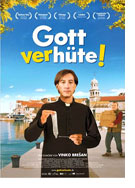

Opening 7 Aug 2014
Directed by:
Vinko Bresan
Writing credits:
Vinko Bresan, Mate Matisic
Principal actors:
Kresimir Mikic, Niksa Butijer, Marija Skaricic, Inge Appelt, Petar Atanasoski
Father Fabian takes up church work on a small island off the coast of Croatia. He works with old Father Jakov whom the villagers accept, contrary to Fabian who doesn’t fit in. Few believers sit with him for confession, until Petar, in desperation, confesses that he has been killing unborn babies, simply by selling condoms. No telling where a confession can lead; in this case Fabian and Petar agree to poke pinholes into condoms before they are sold. Suddenly, a dying village has a surge of newborns; there are more weddings and baptisms than funerals. A third man, the village pharmacist Marin, comes on board and agrees to substitute vitamins for birth control pills. Voila! More babies. The sudden rise in population reveals secret affairs between villagers, puts a newborn on the church’s doorstep, helps a childless couple to a baby, and brings the bishop to the island to investigate after a busybody church member shares her suspicions.
This is amusing and the photography makes the most of a beautiful setting. There is trumpet background music (which has a connection to a main character). Krešimir Mikic is excellent as Fabian. However, the light-heartedness is doomed and the film turns dark. Director Vinko Brešan, who based his film on the play Children of the Priest, says, “The Catholic church is such an influential and dominating institution that I, as a director, had no other choice but to make a film about it. It’s a comedy with gags and jokes like you would see in commedia dell’arte. However, the reality of my home country doesn’t allow me to make just comedies, so that in the second half of the film, I had to include dramatic elements; therefore the end is serious, even overshadowed by a tragedy.”
There seems to be a surge of films about the Catholic Church, e.g., just in the last five months we could have seen Meteora, Im Namen des or Kreuzweg (Stations of the Cross), or even Das Finstere Tal (The Dark Valley). This one stands well with the others and leaves much to think about, as well as allowing a glimpse at life in a small Croatian parish. (Becky Tan)